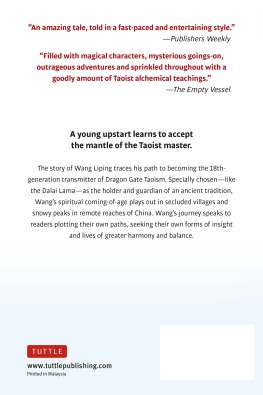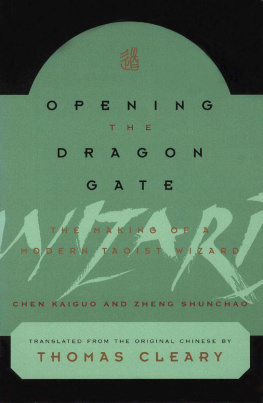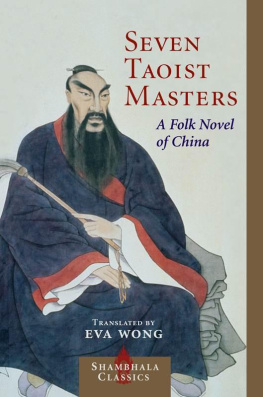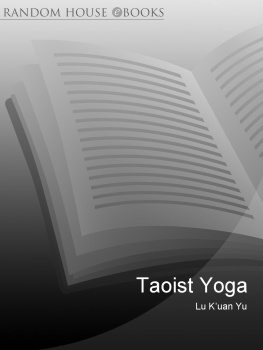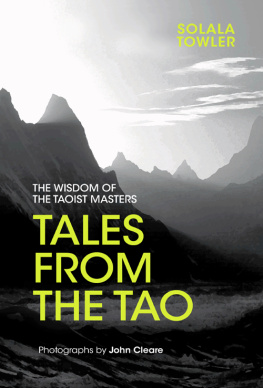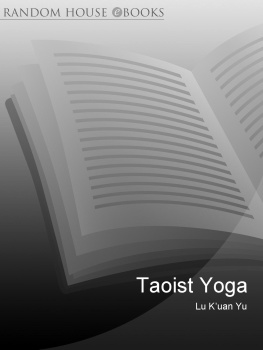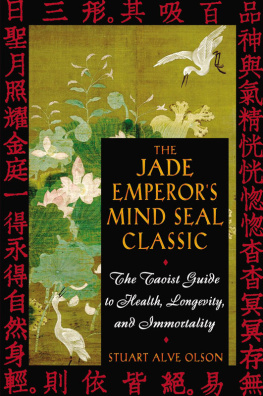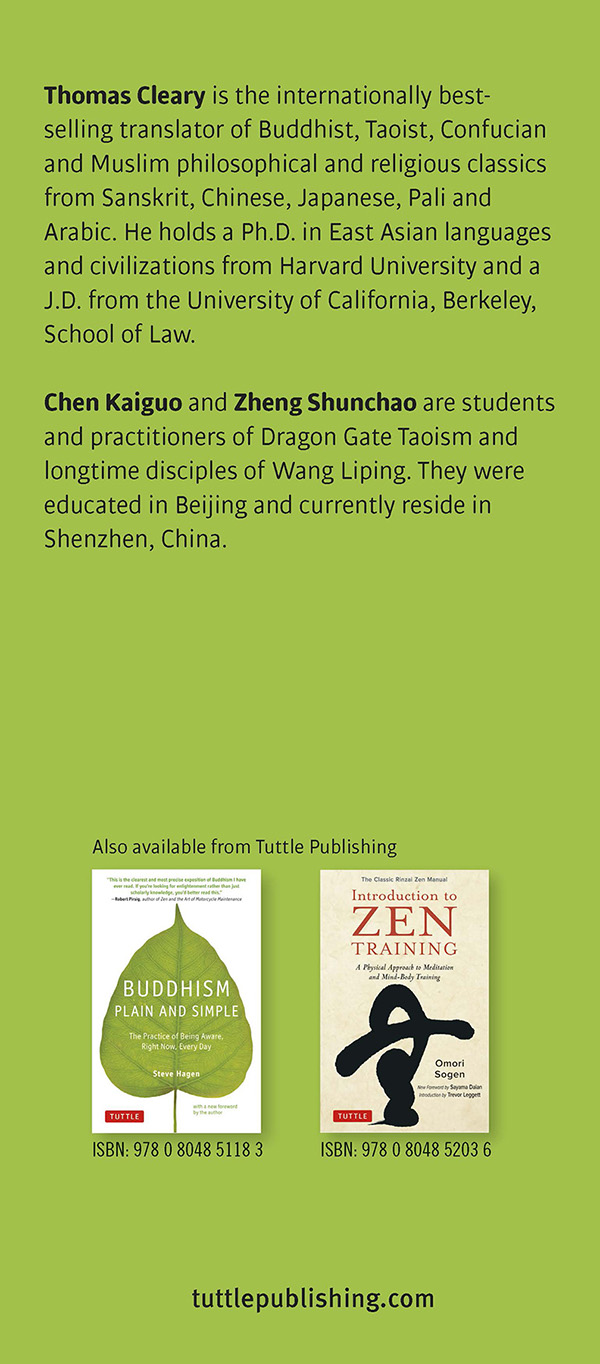The Teachers Search
I n the year 1960, one of the most momentous events in the secret history of China took place one night on a sacred mountain crag, unknown to all the world. The night was brightly lit by the moon from above and pleasantly refreshed by an ocean breeze from below. Three old men, lonely heirs to an ancient knowledge, sat outside a secret cave on holy Mount Lao, deep in meditation.
Mount Lao, or Lao Shan in Chinese, is not well known to many people outside of China. To lay people there, it is the source of most excellent water; to initiates and pilgrims, it is one of the sacred sites of Taoism, Chinas original wisdom tradition, the worlds oldest science. Mount Lao faces the sea on two sides, east and south; steep and imposing, it seems to rise from the very ocean floor. The mountain is scattered with enormous boulders and huge rocks and covered with all sorts of plants and trees. The waves of the sea roar at its feet, white clouds encircle its waist. When you sit on the mountainside gazing at the sea as the sun rises, you feel an enormous sense of transcendence beyond the ordinary world. Thus Mount Lao came to be treasured by Taoist seekers as a place to cultivate realization and develop their essential nature.
Over the centuries, many famous Taoist masters have practiced their secret lore on Mount Lao. Through the years, many Taoist cloisters were built on the mountain; there are also many secret caves in the defiles, covered by foliage and vines, extremely difficult of access and known only to a few.
The three old men sitting on the mountainside that moonlit night in 1960 were masters of the Dragon Gate sect of the Complete Reality school of Taoism, holders of secrets and capacities long believed legendary.
Zhang Hodao, Wayfarer of the Infinite, was the sixteenth-generation Transmitter of the Dragon Gate sect. Eighty-two years old at the time, he had once been the grand physician of the Imperial court of the Qing dynasty (16441911). This wayfarer was popularly called the Uncanny Physician.
Wang Jiaoming, Wayfarer of Pure Serenity, was a seventeenth-generation Transmitter of the Dragon Gate sect. A disciple of the Grand Master Zhang Hodao, he was seventy-two years old at the time. Formerly an instructor at Huangbu Military Academy, he was an advanced expert in martial arts. He was also an expert at the abacus, and was known as the Uncanny Calculator.
Gu Jiaoyi, Wayfarer of Pure Emptiness, was another disciple of Zhang Hodao, and also chosen as a seventeenth-generation Transmitter of the Dragon Gate sect. He had a unique method of curing illness by acupuncture without actually inserting needles into the body; because of this, he was popularly known as the Infinite Acupuncturist.
Over the preceding year, the three Taoist masters had been engrossed in secret consultations about a matter of utmost importance, not only to them, but to the world at large. Advanced in age, they were trying to find a successor, an individual who would bear the knowledge that would enable him to become the eighteenth-generation Transmitter of Dragon Gate Taoism.
The Taoist school of Complete Reality was founded nine centuries ago, when northern China, the ancient homeland and cultural center of the Chinese people, was overrun by mounted warriors of the steppes. The mission of the school during this crisis was to preserve not only the inner teachings of Taoism, but also the inner teachings of Buddhism and Confucianism as well.
Taoists of the Complete Reality school look upon five people as the Five Northern Ancestors: Wang Xuanbu, Zhongli Quan, Lu Dongbin, Liu Haizhan, and Wang Chongyang. Seven outstanding disciples of the last-named master Wang are known as the Seven Realized Ones of the North.
Among those seven was Qiu Chuji, more generally known as Chang-chun, or the Real Man of Eternal Spring. He was the founder of the Dragon Gate sect eight hundred years ago. Such was the spiritual repute of the Real Man of Eternal Spring that Genghis Khan called him to Central Asia and appointed him head of all religions in China under the Khan.
Secrets inconceivable even to other Chinese, let alone people of the West, are still held within the Dragon Gate, even to this very day. Such is the power of the inner teachings that the three elder masters of the sixteenth and seventeenth generations spent countless hours in deep meditation on the problem of finding an heir to this knowledge.
Part of the secret lore of the Dragon Gate is a special book of symbolic patterns, known as Figuring the Backbone. Once used to analyze trends and forecast events, this special book was deliberately scrambled over six hundred years ago by covert Imperial design, as part of a broad campaign to keep the populace in ignorance and in thrall. Fortunately, the original integrity of the book was kept intact within the Dragon Gate sect of Taoism, in accord with its mission of preserving esoteric knowledge.
The new Transmitter the elders sought turned out to be a youth named Wang Liping, who was eleven years old in 1960. Wang Liping was born in 1949, precisely in the middle of the lunar year. People who know him say he was different even as a child. He could always locate misplaced articles around the house and never failed to find his playmates at hide-and-seek, no matter how well they were hidden.
Wang Liping was born in a large city in northeastern China, then later moved with his parents to an ancient fortress town near the famous Everwhite Mountain, Changbai Shan. Through the district of the fortress town cuts Yongding, the Turbid River, which has its source in the depths of Everwhite Mountain. Backed by a mountain and facing a river, the fortress town has an extraordinary energetic force in its atmosphere. With black gold in the ground, it is called Coal City, and has thrived all the more in modern times. This new city in an ancient fortress town is where Wang Liping has lived most of his life.
The Wang families were an important clan in the region, one whose ancestors had once been distinguished. In the time of Wang Lipings father, his family was not as it had once been, but he still managed to graduate from Fengtian Industrial College, which was considered no mean feat in those days.
Mother Wang was a good-natured, kindly woman. She gave birth to four sons and two daughters, all lively and robust except for the second son, Liping, who was slight and weakly. When Liping was one year old, there was a fire in the Wang house. Lost in the commotion, baby Liping got burned on the head. Although the burn healed all right, after that the child continued to suffer from headaches, and his eyesight was also affected. To his mothers dismay, furthermore, none of the doctors they consulted were able to help the boy.
The Wang family had many children, and back then in the late 1950s and early 1960s everyday life in China was hard. Even from childhood little Liping was kind and dutiful, mannerly and deferential, so naturally he was protective of his younger brothers and sisters. He was even that way with his neighborhood friends and playmates. Whenever another child wanted anything and Wang Liping happened to have it, he would give it away freely.
One day in the autumn of 1962, as the Wangs were eating their noon meal, they suddenly heard a loud call at the door: A mouthful of food, please! Now life had been very difficult for the past few years, so there were many people fleeing destitution and seeking food all the way from the central plains to the northeast. Whenever people came to the door begging, Mother Wang would gladly give something to help out.
This time it was Liping who was the first to get up on hearing the beggars cry at the door. Before his mother could rise from the table, he had already grabbed a few vegetable dumplings and was on his way to the door with them. When he opened the door, Liping was startled by what he saw. There were three old men standing there. They looked quite different from the sorts of people who usually came begging. These old men looked kindly and benevolent, and though their clothes were worn and tattered they stood erect like strong young men, their bearing firm and steady, their presence projecting an air of vigor and strength.

